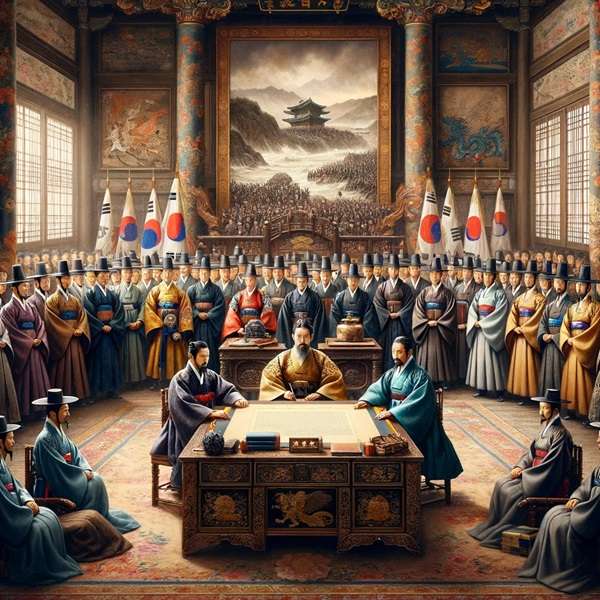
Historical Context
Before delving into the treaty’s details, it’s essential to understand the historical context. The mid-19th century was a period of significant change in East Asia. Japan, under the Meiji Restoration, was rapidly modernizing and looking to expand its influence. Korea, meanwhile, remained a hermit kingdom, staunchly isolationist and under the influence of Qing China.
The Treaty’s Origins
The Treaty of Ganghwa was precipitated by a series of incidents involving Japanese and Korean forces. In 1875, a Japanese gunboat, the Un’yō, was sent to survey coastal waters around the Korean peninsula. When it was fired upon by a Korean fort on Ganghwa Island, Japan seized the opportunity to demand concessions from the Korean government, leading to negotiations that resulted in the treaty.
Key Provisions
The Treaty of Ganghwa had several critical provisions that drastically altered Korea’s foreign relations:
- Opening of Ports: Three Korean ports were opened to Japanese trade – Incheon, Busan, and Wonsan.
- Extraterritoriality: Japanese citizens in Korea were placed under Japanese law, not Korean law.
- Most-Favored-Nation Status: Japan was granted the right to enjoy any privilege or concession that Korea might grant to other foreign nations in the future.
- Independence from China: The treaty implicitly recognized Korea’s independence from Chinese suzerainty, paving the way for greater Japanese influence.
Impact on Korea
The Treaty of Ganghwa had profound implications for Korea:
- Opening to the World: Korea began to engage with other foreign powers, eventually signing treaties with the United States, the United Kingdom, Germany, and others.
- Modernization Efforts: Influenced by foreign technologies and ideas, Korea started to modernize, although these efforts were often hampered by internal strife and external pressures.
- Japanese Influence: The treaty laid the groundwork for increasing Japanese involvement in Korea, culminating in the annexation of Korea by Japan in 1910.
Conclusion
The Treaty of Ganghwa was more than a diplomatic agreement; it was a catalyst for change in a historically isolated nation. While it opened the doors to modernization and international diplomacy, it also set the stage for the eventual loss of sovereignty to Japan. This complex legacy makes the Treaty of Ganghwa a crucial subject of study for anyone interested in Korean history and its path to modernity.
The Goryeo-Khitan Wars: Understanding Korea’s Medieval Struggle for Sovereignty
Hi, I’m [jeybee]. As a long-time resident of Seoul, I’m passionate about uncovering the authentic, everyday magic of Korea. This blog is my way of sharing my favorite spots, tips, and cultural insights with you, beyond the usual tourist traps.

